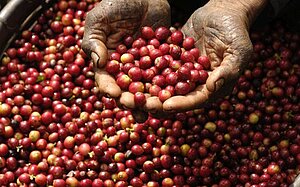Federal Environment Minister visits IKI projects in Costa Rica

Federal Environment Minister Barbara Hendricks’ four-day visit to Costa Rica centred on talks with members of the Government.
Federal Environment Minister Barbara Hendricks’ visit to Costa Rica in mid-June focused on the partnership between the two countries to support implementation of Costa Rica’s Nationally Determined Contribution (NDC) as well as forest conservation and restoration as part of the Bonn Challenge. Minister Hendricks also visited two climate change mitigation projects funded by the German Environment Ministry’s (BMUB) International Climate Initiative (IKI).
One of BMUB’s major and long-established partner countries in the context of its international climate cooperation, Costa Rica is being supported by Germany in its efforts to cut greenhouse gas emissions in all relevant sectors and reach carbon neutrality by 2021. In pursuit of this goal, the German Environment Ministry is funding a project, based at Costa Rica’s National Coffee Institute (ICAFE), to produce the world’s first carbon-neutral coffee. This IKI project assists coffee farmers in securing sustainable livelihoods. Around 150,000 workers are needed during the harvest, so the initiative has a positive impact on living standards for around 400,000 people. Furthermore, the provision of technical and policy advice on coffee growing and processing reduces greenhouse gas emissions by 250,000 t CO2e a year.

Costa Rica is known for its impressive natural environment. This is the starting point for an IKI project involving the Ministry of Environment and Energy (MINAE) that focuses on implementing the National Biocorridor Programme (PNCB). The aim is to connect the country’s many conservation areas using wildlife corridors. With support from Germany, Costa Rica wants to establish a biotope network in Jicaral on the Nicoya peninsula in order to maintain biological diversity and ecosystem services as part of Costa Rica’s National Biodiversity Strategy (2015-2025). Animal migration routes are being studied to identify the corridors that will enable wildlife to migrate safely between the widely scattered conservation areas. In Costa Rica, 36 sites covering 1.7 million hectares – almost one third of the country’s land area – have now been identified as priority wildlife corridors, establishing connectivity between designated conservation areas, ecosystems and habitats.
Federal Environment Minister Hendricks commented: ‘I very much welcome Costa Rica’s national and international commitment to the conservation of biodiversity. Costa Rica has precious mangrove and dry forests and protecting them is extremely important. The country has made major progress with regard to preserving biodiversity, achieving a low-emission energy supply and protecting and developing its forests.’
Germany is also helping Costa Rica to meet its national climate commitments. The transport sector, which produces more than two thirds of all energy-related CO2 emissions, has an important role to play in this context. Here, cooperation with the Ministry of Environment and Energy (MINAE) focuses on urban mobility and energy-efficient transport. The aim is to develop strategies to improve the public transport system and thus reduce traffic congestion, noise and pollutant emissions.
Another transregional project, this time implemented by the International Union for Conservation of Nature (IUCN), supports action to improve adaptation to climate change impacts. In the Sixaola region in southeast Costa Rica, farmers are receiving assistance to ensure that they can continue to diversify arable crops and other useful plants (agro-biodiversity) in order to increase their resilience. Among other things, regional fairs and markets are used as forums for exchanging seeds of various traditional crop varieties.
From 2011 to 2013, an IKI project provided funding for renewable energy training as part of its support for the Center for Research and Development in Renewable Energies (CIDER) at the Earth University in Guácimo. The Center was awarded IKI funding to buy training equipment and resources as well as develop teaching materials and curricula. The students, coming from several different countries in Latin America and Africa, with many of them from poor backgrounds, work on pilot projects and develop technical solutions, which rural communities can copy. The projects cover a range of topics: from the development of highly efficient small biogas plants to metrological analysis for selecting efficient wood-burning stoves, water pumps or solar-powered e-bikes with top speeds of up to 20 kmh.

A total of 24 IKI projects are currently being implemented with Costa Rica, including four bilateral projects with combined funding of more than 17 million euros.
The link has been copied to the clipboard
Contact
IKI Office
Zukunft – Umwelt – Gesellschaft (ZUG) gGmbH
Stresemannstraße 69-71
10963 Berlin











![[Translate to English:]](/legacy/_processed_/5/5/csm_Indien_EE_Solar_Frau_bfcf99c425.jpg)





